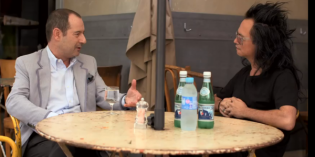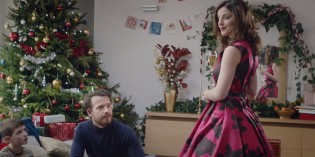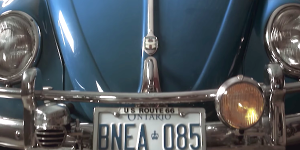The Innovation Lions stand out among the awards at the International Festival of Creativity: there doesn’t need to be a client behind the submissions of new and leading-edge technology, the jury’s deliberations are partly done in public, and the submitting companies must take part in a 10-minute Q&A with the jury’s subject matter experts.
It’s a gruelling process for everyone involved, but it has yielded a Grand Prix – “Megafaces Pavilion” at the Sochi Winter Olympics from the Russian mobile services provider Megafon – and three other winners in the competition’s second year.
Megafaces transmitted images onto a changeable 3D surface in cities across Russia, culminating at a large installation in Sochi. Visitors had pictures of their faces recreated in three dimensions, bulging from a billboard-sized and seemingly flat surface thanks to 11,000 actuators pushing LED lights forward to sculpt the contours of the face.
“It’s indicative of a trend we saw among the entries of the blurring between digital and real experiences – the blurring between marketing communication as an experience and marketing communications becoming a service or technology,” said Innovation jury president Tom Bedecarré, AKQA chairman, president of WPP Ventures and the jury president.
“We wanted to see breakthrough technology, we wanted to see that there was an idea that could be scaled to more than a one-off execution… and [submissions] that empower creativity. We think Megafaces does all that. It’s the first time we’ve seen anything like this from a technology standpoint. We see this scaling larger with physical signage.”
Innovation Lions are less about a given execution, however, and more about the technology behind it and its potential to serve the creative and marketing industries. Juror David J. Blumberg from Blumberg Capital sees this contest as a means of future-proofing the marketing industry by blending its traditional disciplines with invention.
Some of the jury members came from “Cannes’ traditional side – Hollywood meets Madison Avenue, or in other words, media meets advertising,” Blumberg said. “The rest of us come from technology backgrounds, Silicon Valley. So these three areas’ fusion bring together two important things for advertising and for humanity: from the side of Madison Avenue comes an understanding of aesthetics and passions and consumer behaviour; from technology comes incredible new platforms that have never existed before.
“That fusion will drive unlimited new opportunities to not only make great money, but make things better for people.”
Megafaces marks the first time a Lions Grand Prix has gone to Russia, and it is the first Grand Prix awarded to an architectural firm – Asif Khan Ltd.
The overall winners’ list (culled from a total submission pool of 206 entries that were reduced to a shortlist of 29) was very short, with only three other submissions earning Lions (this competition does not award gold, silver or bronze standings).
Canada’s shortlisted entry – Bublcam – did not make the list.
Bedecarré said that, like Bublcam, many submissions focused on photography, video and camera technology. But Brian Wong, founder of Kiip and Canada’s representative on the jury, said the jury liked the Canadian company’s idea of a camera that films and photographs across 360 degrees.
“The spherical design is what got us excited,” Wong said. “The fact that you could put it in a room and, right away, the whole room is captured is what got us excited.”
The three winners were Points, from Breakfast in the U.S (see video below); Fiat Live Store, from AgenciaClick Isobar, which allows car shoppers to connect to a live Fiat car expert and explore vehicles from a first-person perspective through a remote camera; and Ogilvy France‘s Babolat Play, a web-connected tennis racket that carries forward the data collection ideas of Nike’s Fuelband and its competitors.
Want the latest news and winners from the Cannes Lions International Festival of Creativity? Visit Marketing @ Cannes.








